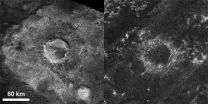(Press-News.org) INDIANAPOLIS -- More than 2,000 former football players are suing the National Football League, saying the league should have taken action earlier to deal with injuries related to concussions more seriously.
But if a lack of speed in tackling concussions warrants criticism, the NFL isn't the only player deserving a penalty, according to a study co-authored by health care and law expert David Orentlicher, who teaches at Indiana University Robert H. McKinney School of Law in Indianapolis.
Neurologists were also slow in sounding the alarm, and for decades, concussions were viewed as a "benign phenomenon," according to Orentlicher.
Orentlicher's study "Concussion and Football: Failures to Respond by the NFL and the Medical Profession," co-authored by William S. David of Harvard Medical School, traces the evolution of the medical understanding of concussion over the past several decades.
"In reviewing the response of the National Football League to concussion, one can easily think that the league was too slow to worry about the medical consequences of head trauma," according to the study published in this month's Social Science Research Network. "But the extent to which its response was unreasonable is unclear. If many medical experts did not worry about concussions, it is difficult to fault the NFL for not worrying either."
"Still one can question the NFL's failure to adopt concussion guidelines in the late 1990s when medical experts did issue guidelines," Orentlicher said.
INFORMATION:
David Orentlicher is the Samuel R. Rosen Professor of Law at IU Robert McKinney School of Law, and co-director of the William S. and Christine S. Hall Center for Law and Health, a unit of the McKinney School of Law, which is on the campus of Indiana University-Purdue University Indianapolis. Orentlicher holds an M.D. from Harvard Medical School and a J.D. from Harvard Law School. He is an adjunct professor of medicine at Indiana University School of Medicine, also at IUPUI.
The study is scheduled for publication in the FIU Law Review of Florida International University College of Law. Orentlicher can be reached at 317-658-1674 or dorentli@iu.edu. For additional assistance, contact Diane Brown at 317-274-2195 or habrown@iu.edu.
Health and law expert: NFL not alone in handling concussions as 'benign' problems
2013-01-18
ELSE PRESS RELEASES FROM THIS DATE:
New study challenges links between day care and behavioral issues
2013-01-18
CHESTNUT HILL, MA (Jan. 17, 2013) – A new study that looked at more than 75,000 children in day care in Norway found little evidence that the amount of time a child spends in child care leads to an increase in behavioral problems, according to researchers from the United States and Norway.
Several prior studies in the U.S. made connections between the time a child spends in day care and behavioral problems, but the results from Norway contradict those earlier findings, the researchers report in the online version of the journal Child Development.
"In Norway, we do not ...
Study findings have potential to prevent,reverse disabilities in children born prematurely
2013-01-18
PORTLAND, Ore. – Physician-scientists at Oregon Health & Science University Doernbecher Children's Hospital are challenging the way pediatric neurologists think about brain injury in the pre-term infant. In a study published online in the Jan. 16 issue of Science Translational Medicine, the OHSU Doernbecher researchers report for the first time that low blood and oxygen flow to the developing brain does not, as previously thought, cause an irreversible loss of brain cells, but rather disrupts the cells' ability to fully mature. This discovery opens up new avenues for potential ...
Want to ace that interview? Make sure your strongest competition is interviewed on a different day
2013-01-18
Whether an applicant receives a high or low score may have more to do with who else was interviewed that day than the overall strength of the applicant pool, according to new research published in Psychological Science, a journal of the Association for Psychological Science.
Drawing on previous research on the gambler fallacy, Uri Simonsohn of The Wharton School of the University of Pennsylvania and Francesca Gino of Harvard Business School hypothesized that admissions interviewers would have a difficult time seeing the forest for the trees. Instead of evaluating applicants ...
In minutes a day, low-income families can improve their kids' health
2013-01-18
URBANA – When low-income families devote three to four extra minutes to regular family mealtimes, their children's ability to achieve and maintain a normal weight improves measurably, according to a new University of Illinois study.
"Children whose families engaged with each other over a 20-minute meal four times a week weighed significantly less than kids who left the table after 15 to 17 minutes. Over time, those extra minutes per meal add up and become really powerful," said Barbara H. Fiese, director of the U of I's Family Resiliency Program.
Childhood obesity ...
Understanding personality for decision-making, longevity, and mental health
2013-01-18
January 17, 2013 – New Orleans – Extraversion does not just explain differences between how people act at social events. How extraverted you are may influence how the brain makes choices – specifically whether you choose an immediate or delayed reward, according to a new study. The work is part of a growing body of research on the vital role of understanding personality in society.
"Understanding how people differ from each other and how that affects various outcomes is something that we all do on an intuitive basis, but personality psychology attempts to bring scientific ...
World's most complex 2-D laser beamsteering array demonstrated
2013-01-18
Most people are familiar with the concept of RADAR. Radio frequency (RF) waves travel through the atmosphere, reflect off of a target, and return to the RADAR system to be processed. The amount of time it takes to return correlates to the object's distance. In recent decades, this technology has been revolutionized by electronically scanned (phased) arrays (ESAs), which transmit the RF waves in a particular direction without mechanical movement. Each emitter varies its phase and amplitude to form a RADAR beam in a particular direction through constructive and destructive ...
NASA beams Mona Lisa to Lunar Reconnaissance Orbiter at the moon
2013-01-18
VIDEO:
NASA Goddard scientists transmitted an image of the Mona Lisa from Earth to the Lunar Reconnaissance Orbiter at the moon by piggybacking on laser pulses that routinely track the spacecraft.
HD...
Click here for more information.
As part of the first demonstration of laser communication with a satellite at the moon, scientists with NASA's Lunar Reconnaissance Orbiter (LRO) beamed an image of the Mona Lisa to the spacecraft from Earth.
The iconic image traveled ...
Titan gets a dune 'makeover'
2013-01-18
Titan's siblings must be jealous. While most of Saturn's moons display their ancient faces pockmarked by thousands of craters, Titan – Saturn's largest moon – may look much younger than it really is because its craters are getting erased. Dunes of exotic, hydrocarbon sand are slowly but steadily filling in its craters, according to new research using observations from NASA's Cassini spacecraft.
"Most of the Saturnian satellites – Titan's siblings – have thousands and thousands of craters on their surface. So far on Titan, of the 50 percent of the surface that we've seen ...
Stroke survivors with PTSD more likely to avoid treatment
2013-01-18
New York, NY — A new survey of stroke survivors has shown that those with post-traumatic stress disorder (PTSD) are less likely to adhere to treatment regimens that reduce the risk of an additional stroke. Researchers found that 65 percent of stroke survivors with PTSD failed to adhere to treatment, compared with 33 percent of those without PTSD. The survey also suggests that nonadherence in PTSD patients is partly explained by increased ambivalence toward medication. Among stroke survivors with PTSD, approximately one in three (38 percent) had concerns about their medications. ...
Severity of emphysema predicts mortality
2013-01-18
Severity of emphysema, as measured by computed tomography (CT), is a strong independent predictor of all-cause, cardiovascular, and respiratory mortality in ever-smokers with or without chronic obstructive pulmonary disease (COPD), according to a study from researchers in Norway. In patients with severe emphysema, airway wall thickness is also associated with mortality from respiratory causes.
"Ours is the first study to examine the relationship between degree of emphysema and mortality in a community-based sample and between airway wall thickness and mortality," said ...



